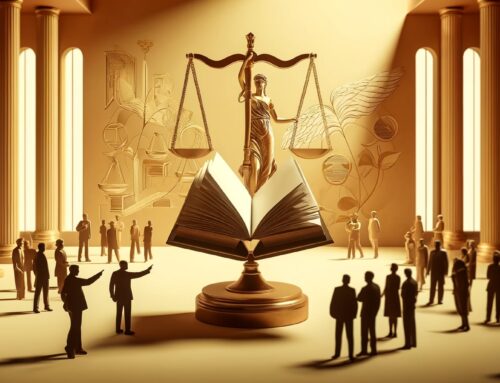Utah Defamation 101
This article is intended as a brief overview of the nuts and bolts of defamation law in Utah. If you think you have been defamed and are considering legal action, this article is intended to give you an understanding of whether a defamation action may be right for you. As always, though, it is important that you speak to an attorney to determine whether pursuing legal action is appropriate in your case.
An Introduction to Defamation Claims
As lawyers in Utah, we at Hepworth Legal have seen instances of defamation cases on the rise. Certainly the internet is at the heart of much of this increase, but regardless of why, it is clear that cases of defamation are more common, and people are justifiably questioning whether to pursue legal action in connection with them.
So what is defamation?
You may have heard it referred to by various terms, “defamation of character,” “libel,” “slander,” etc. Defamation, as a term, is sort of an umbrella-term for various sorts of legal wrongdoing having to do with attacks on, and damage to, a person’s character or reputation.
In short, defamation is a lie about someone that leads to harm to that person’s reputation.
Let’s start to unpack what this means.
Defamation
As with any legal claim, a claim for defamation requires that the plaintiff (suing party) demonstrate certain elements in order to show that they were defamed by the defendant (sued party). For a claim of defamation, those elements are:
(1) That the defendant published one or more statements about the plaintiff;
(2) That the statement was false;
(3) That the statement was not privileged;
(4) That the statement was published with the requisite degree of fault;
(5) That the statement caused damages to the plaintiff.
Generally speaking, if a plaintiff can prove each of these elements, they have a successful claim for defamation.
So what do these elements mean?
Publication: The first element for a defamation claim is the “publication” element.
The defendant must have published a statement about the plaintiff. This doesn’t mean that the defendant must have published a book about the plaintiff. Instead, “publication” in this sense means only that the defendant either said or wrote the statement about the plaintiff to one or more other people. That is, if Donald Defendant wrote a letter to William Witness, and that letter had statements about Paula Plaintiff, then Donald has published statements about Paula to William. The same is true if Donald merely spoke about Paula to William. Likewise if Donald posted statements about Paula on Facebook. Any of these would satisfy the criteria for publication.
The Statement was False: The next element for a defamation claim is that the published statement be false.
This is extremely important. It is not unlawful for Donald Defendant to publish statements about Paula Plaintiff—no matter how offensive the statements are to Paula—if those statements are true.
For example, let’s imagine that Paula has something in her past she considers very embarrassing. Let’s say she was once convicted of tax fraud. She served her punishment and put it in her past, moving on with her life. But let’s imagine that Donald knows about Paula’s past and decides to be a jerk and post about it on Facebook. Suddenly the secret is out, and Paula’s reputation suffers as a result. Let’s imagine she even loses her job over it! Unfortunately, even though Donald has published statements about Paula, and Paula has suffered harm because of Donald’s statements, Donald’s actions do not amount to defamation because the statements were true. Sure, he was being a jerk, but his actions were not unlawful. In order for Donald’s actions to be unlawful—defamatory—he would have to have said things that are false.
The Statement was not Privileged: There are certain contexts in which even otherwise defamatory statements do not amount to defamation. That is, even if Donald Defendant publishes false statements about Paula Plaintiff, and her reputation may be harmed, in certain places/contexts, Donald’s statement may be considered “privileged” – or safe from legal repercussions.
Some common privileges that are invoked are the lawyer-client privilege, the doctor-patient privilege, the priest-penitent privilege, and others. But there are several potential privileges that could apply in any given case, and likewise there are exceptions and work-arounds to many of the privileges that exist. Determining whether a statement was privileged really does require careful review by an attorney.
Requisite Degree of Fault: Here, too, is another element that is highly case-specific, and requiring attorney analysis. But what this element generally refers to is the mental state, or level of intent, of the defendant at the time they published the defamatory statement. That is, what was Donald Defendant thinking when he published defamatory statements about Paula Plaintiff? Is it enough that he was just simply mistaken when he told Facebook that Paula was a registered sex-offender?
In certain cases, specifically those cases involving celebrities or other public persons, the law requires that the defendant act intentionally in publishing defamatory statements, in order to hold them accountable. This makes sense when you consider just how many statements are published about celebrities in the media, and on private Twitter pages, etc. If a celebrity could sue every single person who posted an innocent inaccuracy about them, the entire legal system would suddenly be clogged with cases about Britney Spears alone.
In order to determine, then, exactly what legal standard would apply in your situation, it is very important that you discuss your case with an attorney.
Damages: Here at last is perhaps the heart of every defamation case – at least as it plays out in court. Damages. This element asks the crucial questions: How were you injured? and What is it worth?
What are some examples of defamation in real cases?
In the case of Mast v. Overson, 971 P. 2d 928 – Utah: Court of Appeals 1998, David Mast, the president of Citizen Taxpayers of Utah (CTU), filed a lawsuit against Brent Overson, a Salt Lake County Commissioner, alleging defamation. The dispute arose from a heated public debate over the South Mountain golf course development in Draper, Utah. Mast and CTU opposed the development and placed advertisements in local newspapers, accusing Overson of misleading the public and violating state law. In response, Overson held a press conference and placed his own advertisement, stating that CTU was a ruse and that Mast was a competitor who was not happy with the transaction.
The trial court granted summary judgment to Overson, concluding that his statements were not defamatory as a matter of law. Mast appealed the decision, arguing that the court erred in finding that Overson’s statements were not defamatory and in denying his Rule 56(f) motion, which sought to conduct discovery regarding the statements.
The Utah Court of Appeals affirmed the trial court’s decision, stating that Overson’s statements were not defamatory as a matter of law. The court reasoned that the statements were made in the context of a heated political debate and were not likely to cause personal animus towards Mast in the eyes of the audience. The court also noted that the First Amendment protects the unfettered exchange of ideas for political and social changes, and that expressions of opinion are the mainstay of vigorous public debate.
In summary, the case of Mast v. Overson involved a public debate over a golf course development in Utah. Mast, the president of a nonprofit corporation, accused Overson, a county commissioner, of misleading the public and violating state law. Overson responded by calling Mast a competitor and accusing him of using CTU as a ruse. The court ultimately ruled that Overson’s statements were not defamatory, as they were made in the context of a heated political debate and were protected by the First Amendment.
Defamation in the News
Depp v News Group Newspapers [2020] EWHC 2911 (QB): This high-profile libel trial involved actor Johnny Depp and News Group Newspapers, the publisher of The Sun newspaper. Depp sued for defamation over an article that referred to him as a “wife-beater”.
Rush v Nationwide News [2020] FCAFC 115: This case involved actor Geoffrey Rush, who successfully sued Nationwide News for defamation. The court upheld the award of $2,872,753.10 in damages to Rush.
Dominion Voting Systems v. Fox News: Dominion Voting Systems filed a defamation lawsuit against Fox News for spreading false claims about the 2020 US presidential election. Fox News settled the case for almost $800 million.
Amber Heard v. Johnny Depp: This case involved a defamation lawsuit filed by Amber Heard against Johnny Depp. The initial award of $5 million in punitive damages was reduced to $350,000, and Depp was also awarded $10 million in compensatory damages.
Alex Jones v. Sandy Hook families: Media figure Alex Jones was ordered to pay nearly $1 billion in a defamation suit brought by the families of the Sandy Hook shooting victims. Jones had falsely claimed that the shooting was a hoax.
Brett Favre v. Shannon Sharpe: This ongoing case involves former NFL quarterback Brett Favre, who filed a defamation lawsuit against sports commentator Shannon Sharpe.
Cardi B v. Tasha K: Rapper Cardi B won a defamation lawsuit against blogger Tasha K, who had made false claims about Cardi B.
The Limits of Legal Remedies
When it comes to lawsuits, the methods available to provide a remedy for someone’s injury are highly imperfect. For example, if Vincent Victim is working at his job and loses his hand in an accident, he can sue his job to seek redress for his injury. But the law is not able to give him his hand back, is it? Instead, what does the law do? It compensates Vincent monetarily for the value of his injury and the lost opportunity costs going forward.
When we consider how this applies in the context of a defamation case, things get a little murky. To you and me and everyone else, our reputations are extremely valuable. They represent our face in the world. Our reputations are important to us as a matter of pride, but they are bigger than that. Many of us rely on our reputations within our professions. We have spent years—perhaps our whole lives—establishing our reputations. Socially. Professionally.
Everyone in the world understands just how important your reputation is, and how valuable it is. Except the law. The law doesn’t know how important your reputation is to you. So you say, “My reputation is everything to me!” And what does the law say back?
“Prove it.”
Quantifying Harm in Defamation Cases
If you decide to pursue a legal claim for defamation, let me be the first to warn you: Your job as a plaintiff will have a lot to do with trying to quantify how you were hurt. This is a very tricky thing to do, and your lawyer can help give you guidance as to how to do that. But it could involve questions like, “Did you lose your job?” “Did that client back out of the sale because of the statement?” “Were you forced to move?”
In many cases, you may ultimately have to hire an expert witness who can help value the level of harm you suffered.
(There are limited cases where proving the amount of damages is less important – cases known as “Defamation per se.” However, in Utah, those cases still require basically the same level of proof of damages as standard defamation.)
This discussion of damages is not intended to intimidate you about the chances of success for your case, but instead to prepare you for what is very often the crux of the defamation lawsuit. Putting a dollar figure to a reputational harm is extremely challenging. Your lawyer can (and should) guide you through the process, but be ready to help with the leg work.
This article is a very basic survey course on what is required of a defamation claim. In articles to come, we will address some common defenses to defamation claims (maybe you aren’t the one suing for defamation – maybe someone is suing you; we can help with that, too!), as well as some of the philosophical questions surrounding defamation in today’s world. If you think you have a claim for defamation, or you’re being sued for defamation, reach out to Hepworth Legal today.
Defamation Cases
Doe v. Chao, 540 US 614, 124 S. Ct. 1204, 157 L. Ed. 2d 1122 – Supreme Court, 2004.
Jacob v. Bezzant, 212 P. 3d 535, 2009 UT 37 – Utah: Supreme Court, 2009.
FAA v. Cooper, 566 US 284, 132 S. Ct. 1441, 182 L. Ed. 2d 497 – Supreme Court, 2012.
TRANSUNION LLC v. Ramirez, 141 S. Ct. 2190, 210 L. Ed. 2d 568, 594 US __ – Supreme Court, 2021.
Ashcroft v. Iqbal, 556 US 662, 129 S. Ct. 1937, 173 L. Ed. 2d 868 – Supreme Court, 2009.
Westmont Residential LLC v. Buttars, 340 P. 3d 183, 2014 UT App 291 – Utah: Court of Appeals, 2014.
Westmont Mirador, LLC v. Miller, 362 P. 3d 919, 2014 UT App 209 – Utah: Court of Appeals, 2014.
Jones v. Bock, 549 US 199, 127 S. Ct. 910, 166 L. Ed. 2d 798 – Supreme Court, 2007.
Georgia v. Randolph, 547 US 103, 126 S. Ct. 1515, 164 L. Ed. 2d 208 – Supreme Court, 2006.
State Farm Mut. Automobile Ins. Co. v. Campbell, 538 US 408, 123 S. Ct. 1513, 155 L. Ed. 2d 585 – Supreme Court, 2003.
Grable & Sons Metal Products, Inc. v. Darue Engineering & Mfg., 545 US 308, 125 S. Ct. 2363, 162 L. Ed. 2d 257 – Supreme Court, 2005.
Illinois ex rel. Madigan v. Telemarketing Associates, Inc., 538 US 600, 123 S. Ct. 1829, 155 L. Ed. 2d 793 – Supreme Court, 2003.
US v. Windsor, 570 US 744, 133 S. Ct. 2675, 186 L. Ed. 2d 808 – Supreme Court, 2013.
MedImmune, Inc. v. Genentech, Inc., 549 US 118, 127 S. Ct. 764, 166 L. Ed. 2d 604 – Supreme Court, 2007.
Tory v. Cochran, 544 US 734, 125 S. Ct. 2108, 161 L. Ed. 2d 1042 – Supreme Court, 2005.
USA United Staffing Alliance, LLC v. WORKERS’ COMPENSATION FUND, 213 P. 3d 20, 2009 UT App 160 – Utah: Court of Appeals, 2009.
Puckett v. US, 556 US 129, 129 S. Ct. 1423, 173 L. Ed. 2d 266 – Supreme Court, 2009.
Simmons Media Group, LLC v. WAYKAR, LLC, 335 P. 3d 885, 2014 UT App 145 – Utah: Court of Appeals, 2014.
Ashcroft v. Free Speech Coalition, 535 US 234, 122 S. Ct. 1389, 152 L. Ed. 2d 403 – Supreme Court, 2002.
US v. Alvarez, 567 US 709, 132 S. Ct. 2537, 183 L. Ed. 2d 574 – Supreme Court, 2012.





Leave A Comment